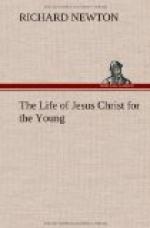“O, Sally,” said little Mary, “how good God is to answer our prayer so soon! Did He send an angel from heaven to bring us this bread?”
“I don’t know who brought it,” answered Sally, “but I am sure that God sent it.”
And how about the miser? For the first time in his life he had given to the poor. Did the promise fail which says, “Give, and it shall be given unto you?” No; God’s promises never fail. He went to the bakery and bought another loaf for himself, and then he went home with different feelings from what he had ever had before. The warm, soft feeling that came into his hard heart when he gave the loaf to those children did not pass away. It grew upon him. He had found so much pleasure in doing that one kind act that he went on and did more. And God blessed him in doing it. He began to pray to that God who had answered the prayer of those little girls for bread in such a strange way. He read the Bible. He went to church. He became a Christian; and some time after, he died a happy Christian death. But before he died, as he was the owner of the cottage in which the little girls lived, he gave it to their father. What a beautiful illustration we have here of our Saviour’s words—“Give, and it shall be given unto you!” This miser gave a loaf of bread to these hungry children and God gave him the grace that made him a Christian! And as we think of this we may well say that “giving is God’s rule for getting.”
And thus we have considered the lesson of liberality which our Saviour taught; the proofs of that lesson found in the Bible; and the illustrations of it from the Bible, from nature, and from everyday life. The three things to be remembered from this subject are the lesson—the proofs—the illustrations.




